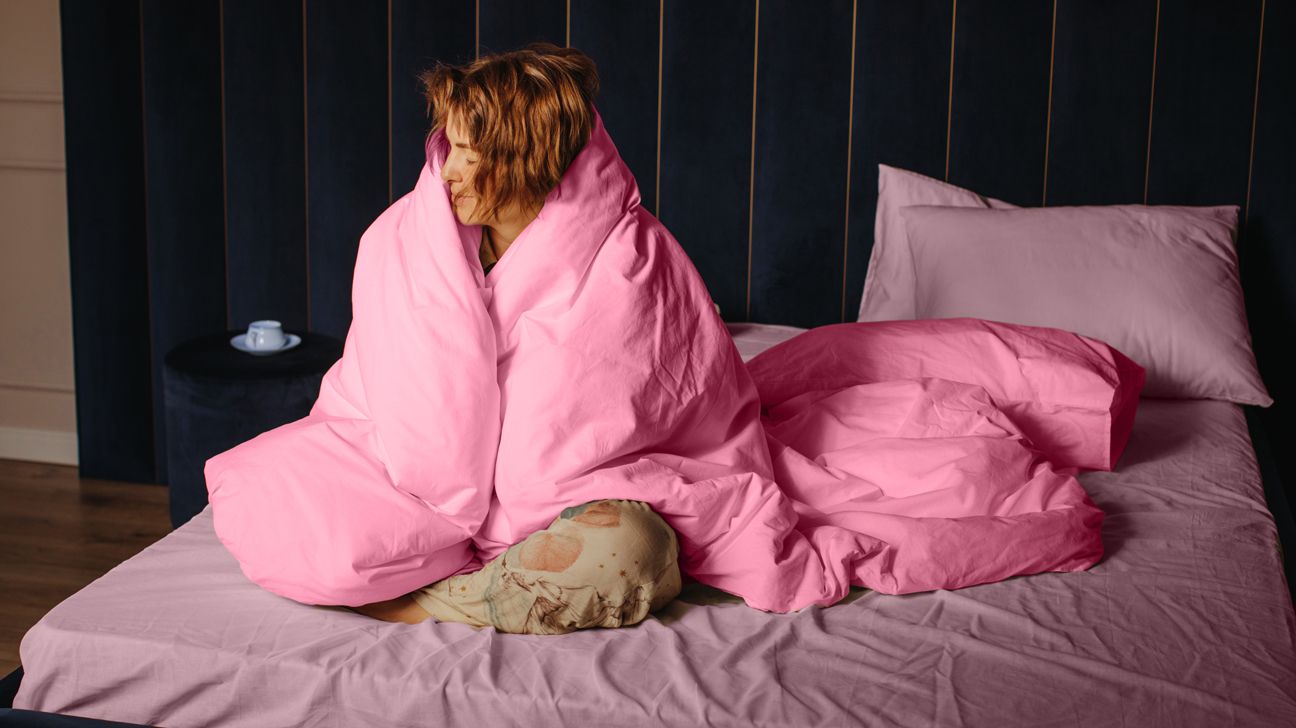More often than not, we’re more focused on our bed’s coziness, rather than its cleanliness. But a freshly washed set of sheets can make bedtime even cozier… and better for you.
So, how often should you really change your sheets? And what happens when you don’t?
Your sheets can get pretty gross pretty quickly, but you likely won’t notice the microscopic gunk they’re collecting. Thousands of tiny dust mites and dead skin cells are thriving in your sheets. And, if you sleep naked, fecal matter (yep, fecal matter… as in poop) build up on your sheets over time.
So, how often should you wash them? According to a survey of more than 1,000 people, the majority of folks change their sheets roughly every 24 days. But many experts recommend washing your sheets every week.
You’ll also def want to wash your sheets more often if you:
- don’t shower before bed
- sleep naked
- let your pet sleep in your bed
- eat in bed
- sweat a lot
- have allergies or asthma
- are sensitive to dust
- have an infection or lesion that touches your bedding
#ProTip
It’s best to wash your sheets once a week. But, if you’re currently a bi-weekly sheet washer, having a spare set can help. Swap out your sheets weekly to keep your laundry loads less frequent.
Okay, so you may be wondering: Do I really need to wash my sheets every week? YUP.
Your sheets are harbingers of grossness, collecting your sweat, skin cells, and bodily secretions. Left unwashed, they can also expose you to (not so) fun things like bacteria, pollen, animal dander, and fungi.
While these aren’t necessarily recipes for a health disaster, unclean sheets likely aren’t great for your overall well-being. A 2017 study found that you can transmit and contract infections through dirty linens.
If you live with eczema, they may trigger a flare up or cause contact dermatitis to develop.
Have asthma or allergies? Dirty sheets can cause symptoms. Even if you’re not one of the more than 24 million Americans with allergies, sleeping on dirty sheets can make you fall victim to a stuffy nose or a sneezing fit.
First rule of sheet washing? Always use hot water. Hot water will help rid your sheets of bacteria and allergens, and the hotter the water, the better the clean.
Be sure to read the care instructions on your sheets’ label. This way you know the hottest heat setting your sheets can handle.
Wondering if you should wash your fitted sheets inside out? It’s completely up to you. While it won’t necessarily lead to a better clean, it may help them hold their shape.
#ProTip
Experts also recommend ironing your sheets after washing to kill any lingering germs. (Wait, people still iron stuff?)
Want to keep your linens fresh between washes? Try these simple tips:
- Take a shower before bed.
- Keep your pets off the sheets.
- Wash your feet before bed if they’re dirty.
- If you wear socks to bed, make sure they’re clean.
- Be sure to remove your makeup before bed.
- Don’t put on creams, lotions, or oils right before bedtime.
- Avoid eating and drinking in bed.
- Don’t sleep or nap in your bed after a sweaty gym sesh.
Your pillowcases capture all the dirt and oils from your face and hair, as well as dead skin cells, bacteria, and more, so you’ll want to wash them every week as well.
It’s also best to replace your pillows themselves every 1 to 2 years, as they can gather lots of unpleasant and unseen grime (not to mention dust mites).
In a 2005 study where the fungal contamination on bedding was assessed, researchers tested pillows ranging from 1.5 to 20 years old. They found pillows to be a primary source of fungi, particularly feather and synthetic-filled pillows.
#ProTip
Use a pillow protector to keep bacteria and allergens at bay.
The same washing timeline generally applies to your other bedding, so you’ll want to wash your comforters, blankets, and duvet covers every 1 to 2 weeks.
Follow the care instructions on the item tags for the best results.
#ProTip
Proud duvet owner? Regularly washing or dry-cleaning your duvet itself can make it last as long as 15 to 20 years!
Caught a bug (aka virus)? You’ll want to change your bedding as soon as you start feeling better. Throw those sheets, pillowcases, and any other used bedding into a hot wash cycle.
Leave your mattress uncovered to let any moisture dry out before putting fresh sheets back on it.
#ProTip
If you’ve got the chills and the sweat is multiplyin’, wash or swap out your sheets more often.
You should really wash your sheets every week. That way if what’s happening between the sheets is a little dirty, your sheets themselves are clean.
To kill the bacteria, allergens, and other nasties that build up on your sheets, always be sure to use the hottest temperature possible when washing. Your sheets’ care tag is your go-to for what temp is juuuust right for your linens. Don’t forget your pillowcases, too!
If you get sick, be sure to wash your sheets as soon as you start feeling better (or more frequently, depending on your illness).
A weekly washing doesn’t work for your schedule? Having another set of sheets can help. Swap out your sheets weekly to cut down on wash time. Investing in protective covers for your pillows or a cover for your duvet can also help your bedding last longer and stay fresher.


